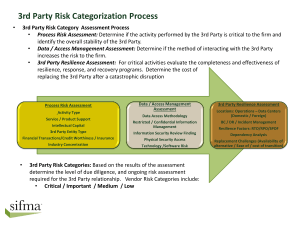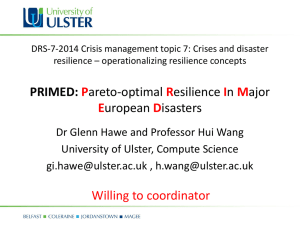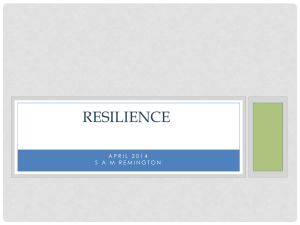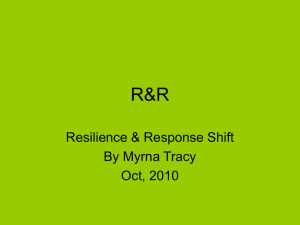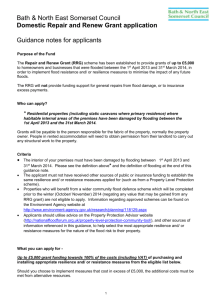Incentivising flood resilient behaviour What`s the role of Government?
advertisement
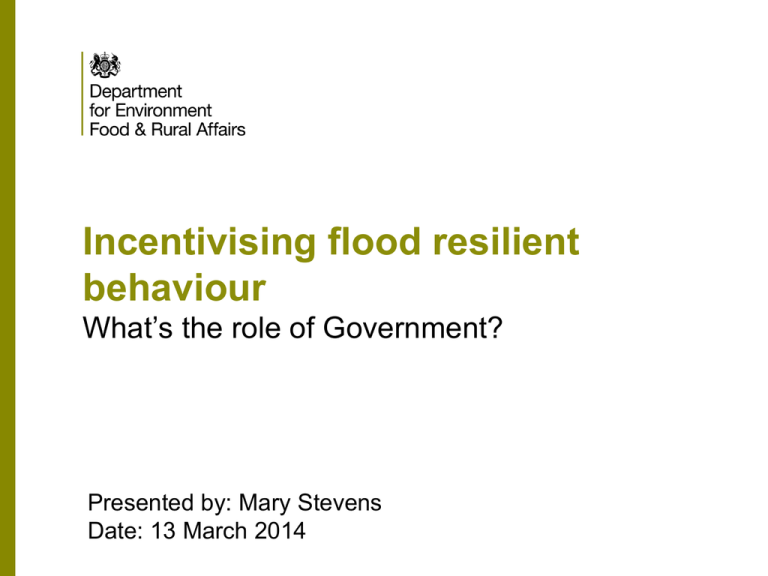
Incentivising flood resilient behaviour What’s the role of Government? Presented by: Mary Stevens Date: 13 March 2014 What is resilience? Questions for the Rapid Evidence Assessment: 1. What does resilience mean in relation to flood risk management? 2. What does the evidence tell us about how to build resilience in relation to FRM? 3. How can resilience be measured? 2 What is resilience? • “Disaster Resilience is the ability of countries, communities and households to manage change, by maintaining or transforming living standards in the face of shocks or stresses - such as earthquakes, drought or violent conflict - without compromising their long-term prospects”. (DfID, 2011 p. 6) 3 What is resilience? • …in terms of relationships and processes rather than as a static characteristic of an individual, household, public service or community. In other words, resilience is not so much a response to the flood hazard itself, but is an emergent characteristic of the way in which the flood response and the subsequent recovery process are managed (Whittle et al., 2010:12). 4 Resilience as a system Social (demographic variables, vulnerability) Economic Community Capital (strength of local ‘glue’) Domains of resilience Infrastructure (type of housing, PLP) (employment, insurance, deprivation, property tenure) Institutional (flood action group, local resilience forum) Based on Cutter et al. (2010), ‘Disaster Resilience Indicators for Benchmarking Baseline Conditions’, Journal of Homeland Security and Emergency Management, 7(1): 1-22. 5 Why does it matter to Government? 1. Improving wellbeing 2. Promoting growth 3. Effective flood risk management 6 There are many factors contributing to behaviour 7 Understanding what works #1 8 Understanding what works #2 9 Frameworks for influencing 10 Defra ‘4Es’ model for sustainable behaviours 11 What else are we doing? • EXEMPLIFY: Defra PLP schemes – and evaluation • ENABLE: Upskilling surveyors • ENCOURAGE: “Repair and Renewal” Grant • ENCOURAGE: Working with the insurance industry to build incentives into Flood Re 12 Challenges and opportunities • Is the balance of actual and planned activity right between reactive (bounce-back /resistance) and pro-active (adaption, transformation) resilience? • How do we manage competing / perverse incentives? • Resilience needs to be maintained – how? • How do we influence the wider Government agenda? (It’s not just about flooding…) How do we promote and share the best practice from the pathfinders? 13 References • Flood Resilience Community Pathfinder Evaluation: Rapid Evidence Assessment, February 2014 (Collingwood Environmental Partnership for Defra, Twigger-Ross, C. et al.) 14



